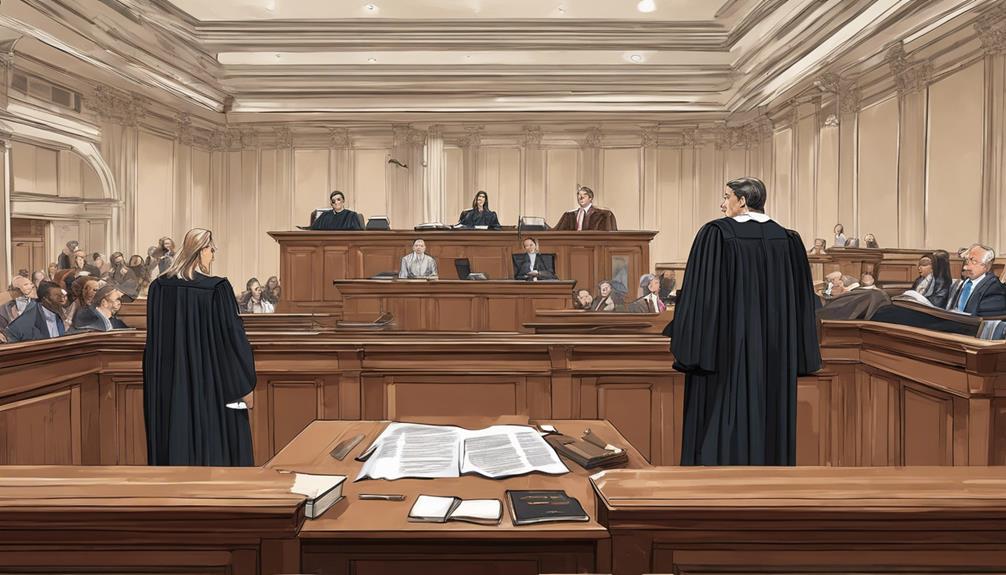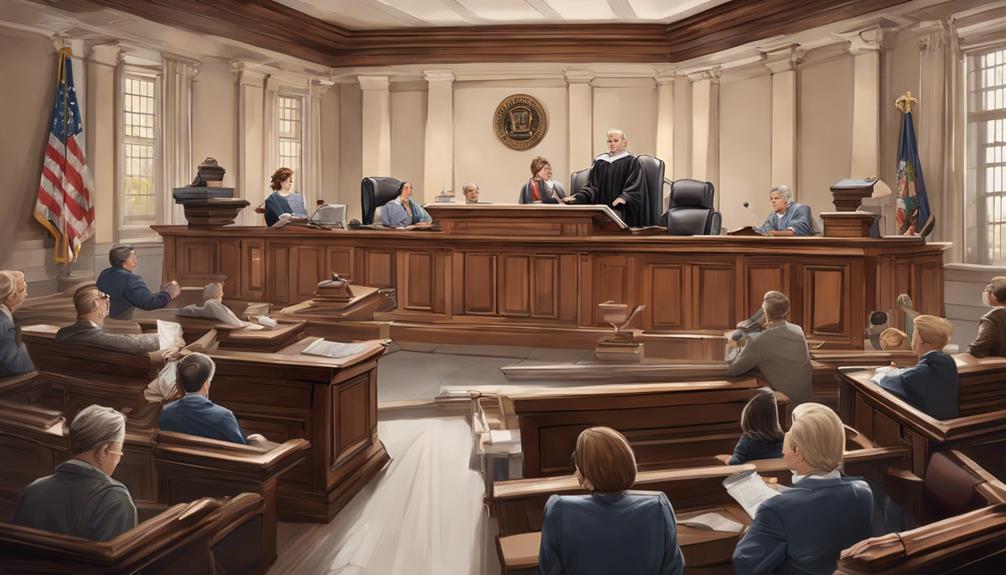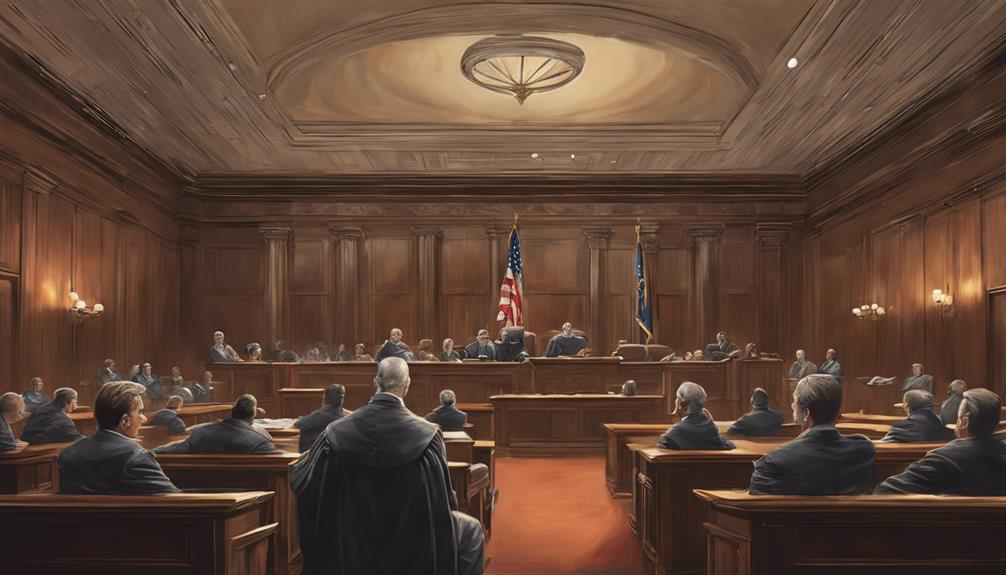Are you ever curious about what actually happens during a plea hearing?
The process may seem straightforward, but there are complexities that often go unnoticed.
Understanding the intricacies of a plea hearing can shed light on the significant impact it can have on a defendant’s case.
Let’s explore the nuances of this critical legal proceeding and unravel its implications together.
Key Takeaways
- Defendant responds to charges.
- Judge ensures understanding and voluntariness.
- Defendant can plead guilty, not guilty, or nolo contendere.
- Legal representation guides through plea process.
Definition of a Plea Hearing
In a plea hearing, the defendant formally responds to criminal charges presented in court. This pivotal moment allows the defendant to plead guilty, not guilty, or no contest to the charges.
The judge presiding over the plea hearing plays a crucial role in ensuring that the defendant fully comprehends the nature of the charges, the rights being waived by entering a plea, and the potential consequences of their plea decision.
Additionally, plea hearings often involve discussions about possible plea agreements between the prosecution and defense. These agreements, known as plea bargains, can impact the legal process significantly.
The defendant’s choice during the plea hearing can shape the course of the case and influence the outcome. It’s a fundamental step in the legal journey where the defendant’s decision carries weight and can affect the proceedings. If you wonder what happens at a Huntles Hearing, we also have you covered here.
Purpose of a Plea Hearing
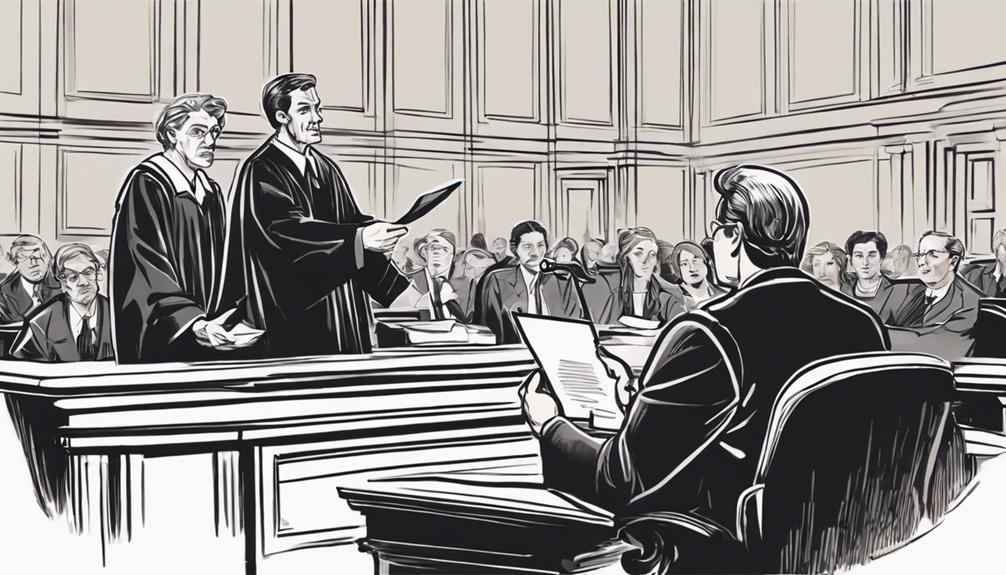
The primary objective of a plea hearing is to determine the defendant’s stance regarding the criminal charges they’re facing.
- Defendant’s Understanding: During the plea hearing, it’s crucial to take care that the defendant fully comprehends their rights, the charges against them, and the implications of their plea.
- Entering a Plea: The defendant has the opportunity to enter a plea of guilty, not guilty, or nolo contendere, signaling their response to the allegations.
- Possibility of Plea Bargain: The plea hearing may lead to a plea bargain agreement, where the defendant agrees to admit guilt in exchange for a lesser charge or sentence.
- Judge’s Review: The judge reviews the plea entered by the defendant to ensure it was made voluntarily, with an understanding of the consequences, and may schedule a sentencing hearing based on the plea.
Procedure in a Plea Hearing
Transitioning from the Purpose of a Plea Hearing, the Procedure in a Plea Hearing involves a structured process where the defendant typically changes their plea to guilty, admitting to the charges they’re facing. The plea hearing takes place with the defendant entering a plea, often as part of a plea bargain.
During this proceeding, the prosecutor presents the charges and evidence that would have been brought up in a trial. The court must ensure that the defendant fully comprehends the charges, the rights being waived by pleading guilty, and that the plea is voluntary. The judge will ask the defendant if they understand the consequences of pleading guilty and if they’ve been advised properly by their defense lawyer.
Subsequently, the judge will confirm the defendant’s affirmation of guilt before deciding whether to accept or reject the plea. This formal acceptance of the guilty plea marks a critical point in the legal process, moving the case towards its resolution.
Differences in Misdemeanor and Felony Cases
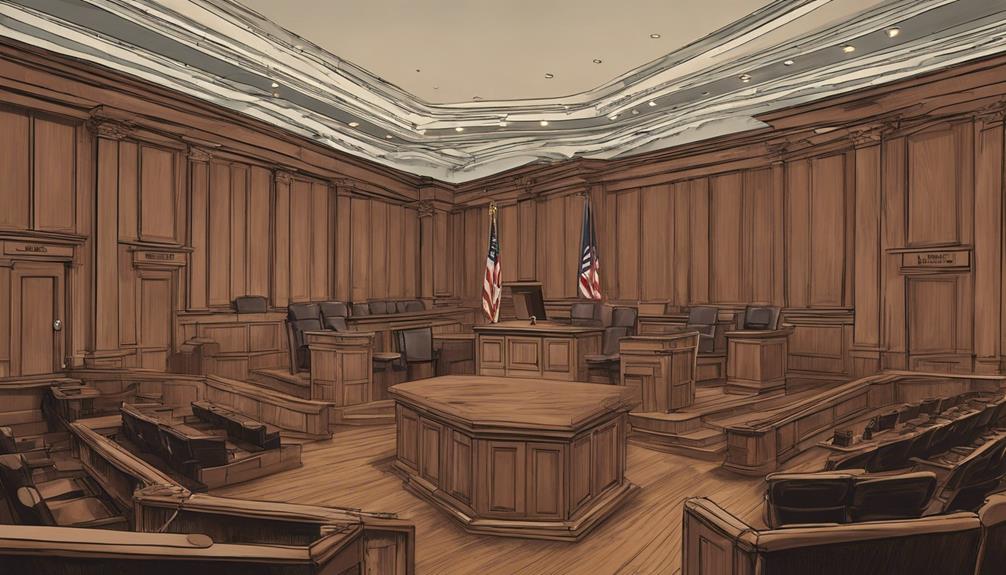
Distinguishing between misdemeanor and felony cases involves crucial considerations regarding the legal procedures and options available for plea entry and sentencing. When comparing the two types of cases, several key differences stand out:
- Plea Entry Process: In misdemeanor cases, judges may allow guilty pleas without counsel, whereas formal plea entry with legal representation is required at the initial appearance.
- Changing Pleas: Both misdemeanor and felony cases offer options for changing pleas and progressing to sentencing, providing flexibility in the legal process.
- Preceding Proceedings: Restrictions on guilty pleas at arraignment are common in felony cases, with preliminary hearings and grand jury proceedings often occurring before plea hearings on indicted charges.
- Judicial Discretion: Judges hold discretion in handling guilty pleas in both misdemeanor and felony cases, considering various factors and legal procedures to ensure fair outcomes for all parties involved.
Importance of Legal Representation
Understanding the importance of legal representation during a plea hearing is crucial for safeguarding the defendant’s rights and ensuring informed decision-making. A criminal defense lawyer plays a vital role in providing legal representation to defendants, guiding them through the complexities of plea agreements, explaining their constitutional rights, and highlighting the potential consequences of different plea options.
By having a lawyer present at a plea hearing, defendants can better comprehend the legal proceedings, including discussions on charges, statutes, and possible sentences. Legal representation not only ensures that the defendant’s rights are protected but also assists in navigating the intricacies of the criminal justice system.
Ultimately, the presence of a knowledgeable attorney can help defendants make informed decisions that align with their best interests and understanding of the implications of their plea in the context of the legal process.
Frequently Asked Questions
What Is the Purpose of a Plea Deal?
The purpose of a plea deal is to efficiently resolve criminal cases, save time and resources, and provide closure for victims.
It allows defendants to plead guilty to lesser charges or receive more lenient sentences in exchange for avoiding trials.
By managing court dockets effectively and reducing the burden on the judicial system, plea deals streamline the legal process.
Factors like evidence strength, charge severity, and sentencing guidelines are crucial in negotiating and accepting plea deals.
What Does It Mean to Enter a Plea?
Entering a plea means formally responding to criminal charges by stating guilt, innocence, or no contest. It directs the legal process, determining trial or sentencing. Acknowledging the charges and consequences is crucial.
The plea entered carries significant legal weight, impacting the case’s course and outcomes. At times, it’s like deciding which road to take at a crossroads.
Does Pleading Guilty Reduce Your Sentence?
Pleading guilty can lead to reduced sentences through negotiated plea bargains. Defendants who plead guilty often receive sentencing discounts compared to those who go to trial. The extent of reduction varies based on case circumstances and agreements.
Judges may consider a defendant’s acceptance of guilt and cooperation when determining sentencing post-plea. Overall, pleading guilty can result in more favorable sentencing outcomes compared to risking a trial and potentially facing harsher penalties.
Why Do Judges Reject Plea Bargains?
Judges reject plea bargains for various reasons. Perhaps the proposed agreement doesn’t sufficiently address the seriousness of the crime or fails to consider the victim’s perspective. If the evidence is strong and demands a trial for justice, a plea bargain may be rejected.
Additionally, plea deals lacking accountability or community safety measures might face rejection. Ultimately, judges prioritize fairness, accountability, and public safety when evaluating plea bargains.
Conclusion
In conclusion, a plea hearing is a pivotal moment in the legal process where defendants must make a critical decision about their case. It’s like standing at a crossroads, with each plea option leading down a different path.
The judge, prosecutor, and defense lawyer all play key roles in guiding the defendant through this complex junction. It’s crucial for defendants to seek legal counsel to navigate this intricate terrain and make informed choices.
